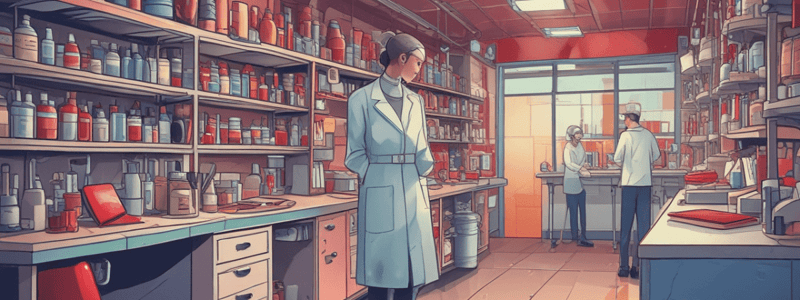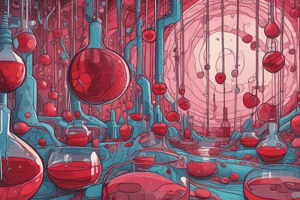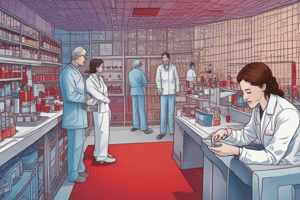Podcast
Questions and Answers
What is the primary function of platelets in the body?
What is the primary function of platelets in the body?
- To maintain proper blood osmotic pressure
- To transport nutrients and metabolites within the system
- To provide immune defense
- To form a barrier to limit blood loss at an injured site (correct)
What is the approximate percentage of water in plasma?
What is the approximate percentage of water in plasma?
- 92% (correct)
- 90%
- 80%
- 85%
Which of the following is NOT a function of plasma?
Which of the following is NOT a function of plasma?
- Producing immunoglobulins (correct)
- Coagulation
- Maintaining proper blood osmotic pressure
- Transporting nutrients and metabolites
What is the term for the process of forming a barrier to limit blood loss at an injured site?
What is the term for the process of forming a barrier to limit blood loss at an injured site?
Which of the following proteins is NOT a component of plasma?
Which of the following proteins is NOT a component of plasma?
What is the approximate volume of plasma in an average human male?
What is the approximate volume of plasma in an average human male?
What is the primary function of the Hematology Laboratory in relation to a physician's diagnosis?
What is the primary function of the Hematology Laboratory in relation to a physician's diagnosis?
What is the term for the process of formation and development of blood cells?
What is the term for the process of formation and development of blood cells?
Which of the following components of blood is involved in the body's defense against the invasion of foreign antigens?
Which of the following components of blood is involved in the body's defense against the invasion of foreign antigens?
What is the primary function of erythrocytes in the blood?
What is the primary function of erythrocytes in the blood?
What is the term for the study of formed cellular blood elements?
What is the term for the study of formed cellular blood elements?
What percentage of blood is composed of plasma?
What percentage of blood is composed of plasma?
What is the primary function of leukocytes in the body?
What is the primary function of leukocytes in the body?
Which type of immune response is characterized by a slow and long-lasting immunity?
Which type of immune response is characterized by a slow and long-lasting immunity?
What is the typical location of leukocyte production in the body?
What is the typical location of leukocyte production in the body?
What is the characteristic feature of Polymorphonuclear Leucocytes?
What is the characteristic feature of Polymorphonuclear Leucocytes?
What is the normal range of leukocyte count in adults per microliter of blood?
What is the normal range of leukocyte count in adults per microliter of blood?
Which type of leukocytes includes neutrophils, eosinophils, and basophils?
Which type of leukocytes includes neutrophils, eosinophils, and basophils?
What is the typical diameter of neutrophils?
What is the typical diameter of neutrophils?
What is the characteristic of the nucleus of eosinophils?
What is the characteristic of the nucleus of eosinophils?
What is the significance of an increase in eosinophils?
What is the significance of an increase in eosinophils?
What is the characteristic of the cytoplasm of basophils?
What is the characteristic of the cytoplasm of basophils?
What is the typical diameter of monocytes?
What is the typical diameter of monocytes?
What is the characteristic of the nucleus of monocytes?
What is the characteristic of the nucleus of monocytes?
What is the primary function of macrophages at the site of infection?
What is the primary function of macrophages at the site of infection?
Which of the following leukocytes is primarily involved in cell-mediated immunity?
Which of the following leukocytes is primarily involved in cell-mediated immunity?
What is the term for an increase in the absolute number of lymphocytes in the blood?
What is the term for an increase in the absolute number of lymphocytes in the blood?
What is the normal range of monocytes in the blood?
What is the normal range of monocytes in the blood?
What is the primary site of maturation for B lymphocytes?
What is the primary site of maturation for B lymphocytes?
What is the characteristic appearance of the nucleus of a macrophage?
What is the characteristic appearance of the nucleus of a macrophage?
Study Notes
Components of Blood
- Plasma makes up 55% of blood, involved in transport of nutrients and metabolites, immune defense, and coagulation
- Erythrocytes (RBCs) make up 43% of blood, contain hemoglobin, and function in transporting O2 and CO2
- Leukocytes (WBCs) make up 1% of blood, involved in body's defense against infectious agents
- Platelets (thrombocytes) make up 1% of blood, involved in haemostasis and forming a barrier to limit blood loss at an injured site
Function of Plasma
- Maintains proper blood osmotic pressure, important for total body fluid balance
- Transports nutrients and metabolites within the system
- Involved in immune defense, contains immunoglobulins and complement
- Serves as a reservoir for proteins that circulate in the blood as inactive enzymes
Haematology
- Study of formed cellular blood elements: WBCs, RBCs, and platelets
- Haemostasis: arrest of bleeding by forming a barrier to blood loss
- Haematopoiesis: dynamic formation and development of blood cells, normally in the bone marrow
Leukocytes (WBCs)
- Heterogeneous group of nucleated cells responsible for the body's defenses
- Produced in the bone marrow and lymphoid tissues
- Five distinct cell types: polymorphonuclear leucocytes/granulocytes, mononuclear leucocytes
Polymorphonuclear Leucocytes (Granulocytes)
- Contain small granules in their cytoplasm
- Three types: neutrophils, eosinophils, and basophils
- Neutrophils: 10-12µm in diameter, 2-5 lobes to their nucleus, stains purple violet
- Eosinophils: same size as neutrophils, 2 lobes to their nucleus, stains orange pink
- Basophils: 10-12µm in diameter, kidney-shaped nucleus, stains deep purple/blue
Monocytes and Macrophages
- Monocytes: largest white cells, 14-18µm in diameter, centrally placed nucleus, pale violet
- Macrophage: result of monocyte entering tissues, 15-80µm in diameter, gray-blue cytoplasm, round nucleus
Lymphocytes
- Derived from common lymphoid progenitor cell (CLP)
- Two main types: T lymphocytes (60-80% of lymph population) and B lymphocytes (10-20%)
- Natural killer cells (NK) make up ~2% of lymph population
Studying That Suits You
Use AI to generate personalized quizzes and flashcards to suit your learning preferences.
Related Documents
Description
Test your knowledge on the roles of the Hematology Laboratory in diagnosing and monitoring hematological disorders, including confirming clinical impressions, establishing diagnoses, and detecting unsuspected disorders. This quiz covers the basic concepts of Haematology.




